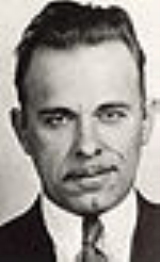
John Dillinger
Overview
John Herbert Dillinger, Jr. (June 22, 1903 – July 22, 1934) was an American bank robber
in Depression-era
United States
. He was charged with, but never convicted of, the murder of an East Chicago, Indiana police officer during a shoot-out. This was his only alleged homicide. His gang robbed two dozen banks and four police stations. Dillinger escaped from jail twice.
In 1933–34, seen in retrospect as the heyday of the Depression-era outlaw, Dillinger was the most notorious of all, standing out even among more violent criminals such as Baby Face Nelson
, Pretty Boy Floyd
, and Bonnie and Clyde
.
Bank robbery
Bank robbery is the crime of stealing from a bank during opening hours. According to the Federal Bureau of Investigation's Uniform Crime Reporting Program, robbery is "the taking or attempting to take anything of value from the care, custody, or control of a person or persons by force or threat of...
in Depression-era
Great Depression
The Great Depression was a severe worldwide economic depression in the decade preceding World War II. The timing of the Great Depression varied across nations, but in most countries it started in about 1929 and lasted until the late 1930s or early 1940s...
United States
United States
The United States of America is a federal constitutional republic comprising fifty states and a federal district...
. He was charged with, but never convicted of, the murder of an East Chicago, Indiana police officer during a shoot-out. This was his only alleged homicide. His gang robbed two dozen banks and four police stations. Dillinger escaped from jail twice.
In 1933–34, seen in retrospect as the heyday of the Depression-era outlaw, Dillinger was the most notorious of all, standing out even among more violent criminals such as Baby Face Nelson
Baby Face Nelson
Lester Joseph Gillis , known under the pseudonym George Nelson, was a bank robber and murderer in the 1930s. Gillis was known as Baby Face Nelson, a name given to him due to his youthful appearance and small stature...
, Pretty Boy Floyd
Pretty Boy Floyd
Charles Arthur "Pretty Boy" Floyd was an American bank robber. He operated in the West South Central States, and his criminal exploits gained heavy press coverage in the 1930s. Like most other prominent outlaws of that era, he was killed by law enforcement officers...
, and Bonnie and Clyde
Bonnie and Clyde
Bonnie Elizabeth Parker and Clyde Chestnut Barrow were well-known outlaws, robbers, and criminals who traveled the Central United States with their gang during the Great Depression. Their exploits captured the attention of the American public during the "public enemy era" between 1931 and 1934...
.
Unanswered Questions

